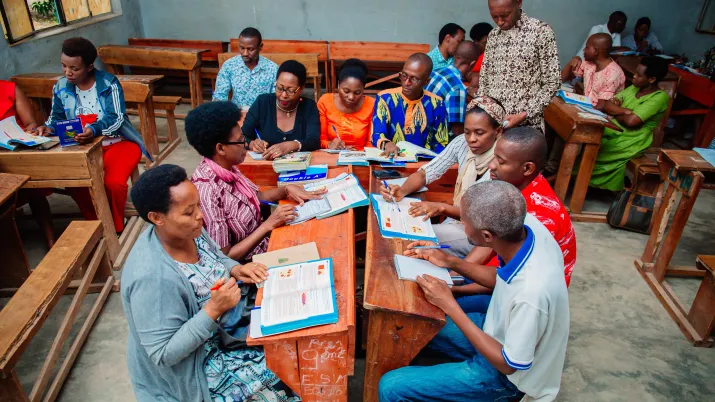Share the page
Gender Flagship: integrating gender equality into public policies and budgets
Project

-
Project start date
-
Status
Ongoing
-
Project end date
-
-
Financing amount (Euro)
-
4,8m
-
Country and region
-
Germany, Cyprus, Spain, France, Greece, Ireland, Italy, Portugal, Romania, Europe
-
Funders

The Gender Flagship project aims to lastingly transform public policies to improve gender equality in participating EU member States.
Our mission: to integrate the gender dimension into public policies and budgets
The Gender Flagship project aims to strengthen the capacity of participating member States to integrate the gender dimension into the development of public policies and budgets through concrete tools, peer-to-peer dialogue and tailor-made support.

It has a clear ambition:
- Raise awareness and cultivate a European ground for gender equality;
- Promote gender mainstreaming in public policies and budgets;
- Support public officials in implementing gender mainstreaming tools.
To this end, Expertise France works alongside the European University Institute (EUI), the European Institute for Gender Equality (EIGE) and the European Commission’s Reform and Investment Task Force (SG REFORM) to support 12 beneficiary authorities in 9 EU Member States, at both central and decentralised levels.
What is Gender Mainstreaming
A tried-and-tested and adaptable methodology
The Gender Flagship project is based on a rigorous methodological approach, co-constructed with the beneficiary authorities. It combines:
- technical tools, such as gender-responsive budgeting, gender impact assessments and gender data analysis;
- tailor-made support, with local experts and a methodology designed to build capacity, decompartmentalise practices, and help concrete solutions emerge;
- constant dialogue between experts, institutions and practitioners, including thematic workshops, study visits abroad to identify best practices, and exchanges between administrations.
Tools for gender mainstreaming
Gender mainstreaming is one of the European Union's priorities, and involves taking gender equality into account at every stage of public decision-making. To achieve this, Expertise France offers concrete tools that have been tested and adapted to the realities on the ground:
- Gender-sensitive budgeting: to analyse the effects of public budgets on inequalities, redirect spending if necessary, and improve transparency and accountability.
- Gender impact studies: to anticipate the effects of a policy on equality and adapt measures right from the design stage.
- Gender indicators and sex-disaggregated data: to better understand gaps and target public action.
These tools are mobilised, tested and shared by partner administrations, with expert support in the field.
"Gender mainstreaming not only makes it possible to correct inequalities between women and men, but also to strengthen the quality, effectiveness and impact of public policies and budget processes."
- Director, SG Reform, European Commission

An overall involvement of European stakeholders
The Gender Flagship project stands out for its methodology rooted in public action, and its ability to build bridges between experts, public officials and partner institutions.
Therefore, we implement the following activities:
- Thematic workshops on targeted issues: data, indicators, budgeting, cost of gender-based violence, etc.
- Study visits abroad to discover inspiring initiatives and exchange ideas with peers.
- A platform for exchanges between European institutions and national and local administrations.
- Tailor-made expertise and follow-up, adapted to realities on the ground.
 © Vitor Hugo Oliveira
© Vitor Hugo Oliveira
A concrete impact on administrations and citizens
Thanks to the project's support:
- Administrations are equipped to integrate gender into all stages of public policy, from design to evaluation;
- Cooperation between administrations is strengthened, including between national and local levels.
- Sustainable dynamics have been set in motion, as in Greece, where the project, initially national in scope, is now being rolled out at local level.
- Policies become fairer, more transparent and better aligned with European objectives.
"The flagship project on gender-responsive policies and budgeting has enabled us to gain a finer insight into the policies implemented within European Union administrations, to adjust them where necessary to best meet the needs and interests of both women and men, and to report on their concrete impact."
- Gender Flagship Project Manager

The Gender Flagship project is funded by the European Union through the TSI - Technical Support Instrument - and implemented by Expertise France in cooperation with the European Commission.

Sustainable Development Goals
SDG5 - Gender equality
Achieve gender equality and empower all women and girls

For further reading
Reducing the cost of gender-based violence
Gender-based violence represents a major challenge in both human and economic terms. Through the Gender Flagship project funded by the European Union, Expertise France is supporting Member States in a...
Published on November 26, 2024
Key figures
- 9 EU Member States involved
- 12 beneficiary authorities
- 3,300 people trained
- 29 methodological tools developed
Our projects on gender equality
SoNG – The Ocean and the Land for the People
Ongoing
2025 - 2030
Funders : Agence Française de Développement
PEERS - Africa-Europe Partnership to Exchange on Education Reforms
Ongoing
2025 - 2030
Funders : European Union






